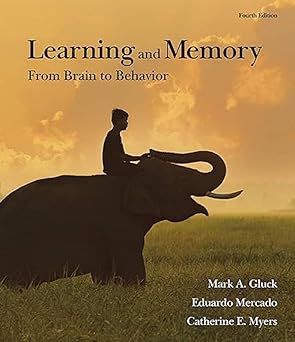Key Highlights
- •📚 Comprehensive coverage of learning and memory principles.
- •🧠 Strong focus on the link between brain function and behavior.
- •⭐ Updated 4th Edition incorporating current research findings.
Description
Ready to explore the amazing world of how we learn and remember? Dive into Learning and Memory: From Brain to Behavior, 4th Edition by Mark Gluck. This updated edition is your guide to understnding the fascinating link between our brains and how we actually learn and recall information.
Who is this book for? It's perfect for undergraduate students in psychology, neuroscience, or cognitive science courses. It's also an excellant resource for graduate students needing a solid foundation, researchers looking for a comprehensive overview, or even just curious minds wanting to know how memory works at a deeper level. If you're studying brain function or behavior, this book is definately for you.
What problem does this book solve? Ever wondered how a complex organ like the brain creates something as fluid as a memory? Or how different brain systems contribute to learning various skills? This book tackles these big questions. It bridges the gap between biological processes (the 'brain' part) and psychological experiences (the 'behavior' part), making complex neuroscience concepts accessible and connecting them to real-world learning and memory phenomena.
What will you gain from reading it? You'll get a clear, thorough understanding of the core principles of learning and memory. The book covers everything from basic conditioning to complex cognitive processes, illustrating them with current research findings and relatable examples. You learn about different memory systems, the impact of brain damage, and the mechanisms behind learning difficulties. This book help you build a robust knowledge base in cognitive neuroscience and behavioral psychology.
Why is it worth reading? This isnt just another textbook. It’s a highly regarded work, now in its 4th edition, reflecting the latest advancements in the field. Mark Gluck expertly integrates findings from animal research, human neuropsychology, and cognitive approaches. Its focus on the 'brain to behavior' connection provides a unique and holistic perspective that is crucial for truly understanding learning and memory. Don't miss out on this essential guide! Get your PDF copy today and start unlocking the secrets of the mind!
FAQ
Is this book suitable for someone with no prior background in neuroscience or psychology?
While it's a comprehensive textbook designed for university courses, it's written clearly. A motivated beginner could potentially use it for self-study, but some introductory knowledge of biology and psychology would be helpful.
What's new in the 4th edition compared to previous ones?
The 4th edition incorporates updated research findings, revised chapters for better clarity, and potentially new examples or case studies reflecting the latest advancements in understanding learning and memory mechanisms.
Does this book cover specific memory disorders like Alzheimer's or amnesia?
Yes, the book typically discusses various memory impairments and disorders, often using case studies (like the famous case of H.M.) to illustrate how brain damage affects different memory systems.
Is this just about human memory, or does it include animal studies?
It integrates findings from both human and animal research, which is crucial for understanding the underlying biological mechanisms of learning and memory across species.
Can I use this book to prepare for a cognitive neuroscience course?
Absolutely! This book is widely used as a primary textbook for undergraduate and introductory graduate courses in learning and memory, cognitive neuroscience, and behavioral psychology. It covers the core topics very well.
How quickly will I recieve the PDF after purchase?
Typically, you should receive an email with the PDF download link within a few hours of completing your purchase, often much sooner.
Reader Reviews
About the Author
Mark A. Gluck is a Professor of Neuroscience at Rutgers University-Newark and a leading researcher in computational neuroscience, particularly known for his work on the neural bases of learning and memory. His research integrates cognitive models with neurobiological data, significantly contributing to our understanding of how brain systems like the hippocampus support memory function and dysfunction.
